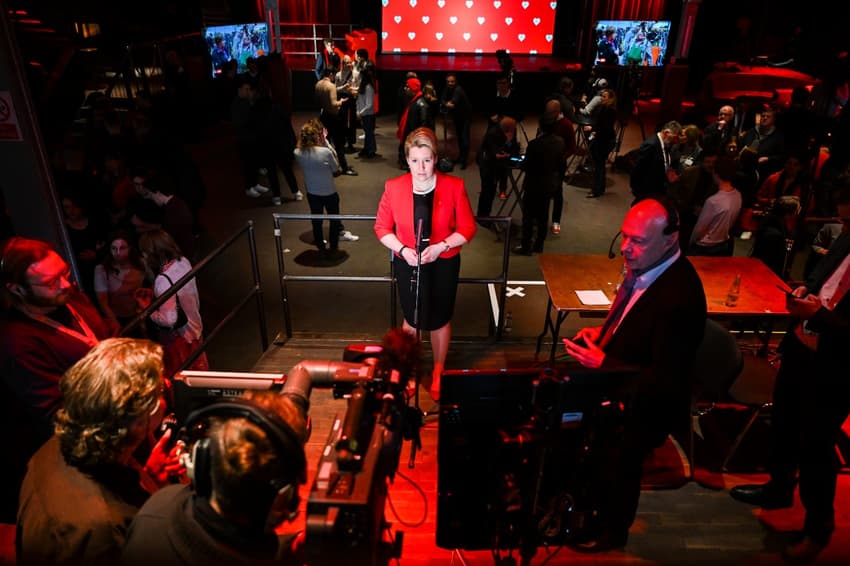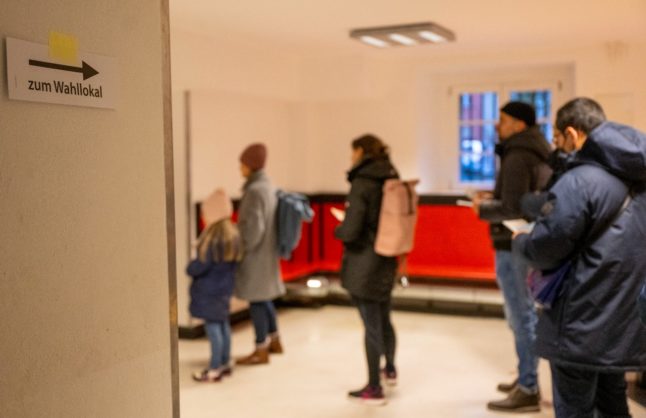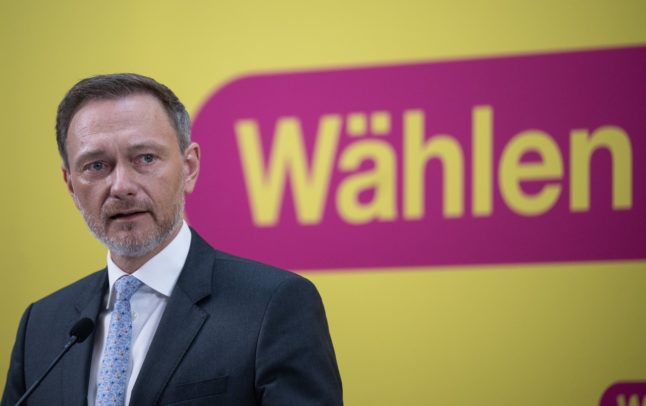How did the SPD lose so badly in Berlin - and what happens next?

The re-run of the Berlin state elections on Sunday saw the centre-left Social Democrats (SPD) achieve their worst result ever, while the opposition CDU emerged as the surprise largest party. So why are people in the capital so disillusioned with the SPD - and can they still make it into power?
"A year is short when you have to deal with three simultaneous crises and a repeat election," Berlin Mayor Franziska Giffey (SPD) said on the night of the election, after her party suffered humiliating electoral losses.
The centre-left SPD has long dominated politics in the German capital - and has been the largest party in the Senate for two decades. But on Sunday, disillusionment with the city's chaotic management appeared to win out, with the conservative CDU sweeping to victory at 28 percentage points compared to the SPD's 18.
For the Berlin wing of the SPD, it is the party's worst result in the post-war period. And with a ten percent drop in turnout at the re-rerun of the elections, it also speaks to a more widespread weariness at Berlin's politics - not to mention the sense of inertia when it comes to major problems facing the city.
By all accounts, the result is a catastrophe for the current Social Democrat-led coalition - but due to Germany's electoral system, it doesn't necessarily mean that the city-state will see a change in government any time soon.
Here's what you need to know.
How did each of the parties fare in the elections?
It was a night of disappointment for pretty much all of the parties battling for seats in the Senate on Sunday - with one notable exception. With a fiercely targeted campaign focussed on the perceived mismanagement of the city, the centre-right CDU managed to grow its vote share by a full ten percent and become the largest party in Berlin by some margin.
Analysis carried out by Tagesschau showed that the CDU managed to hold its 2021 vote share while also poaching support from almost all other parties. An incredible 60,000 voters defected from the SPD to the CDU on Sunday, with the party also gaining 37,000 votes from former FDP supporters, 17,000 votes from former Greens, 12,000 from the far-right Alternative for Germany (AfD) and even 11,000 from the left-wing Die Linke.
In stark contrast, the SPD managed to sink even lower than its historically low 2021 result, dropping from around 21 percent to just 18.4. According to the most recent count, the centre-left party ended up neck-and-neck with the Greens, netting just 105 more votes than its eco-friendly rivals and current coalition partners.
Meanwhile, the third coalition partner in Berlin's red-red-green coalition - Die Linke - secured just over 12 percent of the vote. The AfD gained an extra percent point and landed on nine percent, while the liberal FDP achieved just 4.6 percent of the vote and failed to make it into the Senate.
READ ALSO: Scholz's Social Democrats suffer blow with Berlin election loss
What were the key issues at play?
As you might expect for an election that had to be re-held, the management of the city - or perceived lack of it - was a key campaign issue in the run-up to the vote.
Back in November, the State Constitutional Court ruled that both the district and state elections would have to be repeated following a spate of gaffs that had likely affected the outcome of the first vote. Back on September 26th, 2021, Berliners had faced a 'super' election day involving four separate votes: federal, state and district governments, plus a referendum on housing.
Astoundingly, a decision was made to hold the Berlin marathon on the same day - leading to queues and delays at polling stations as delivery drivers were unable to re-stock the ballot papers.

Voters stand in line at a polling station in the Berlin district of Pankow. Photo: picture alliance/dpa | Monika Skolimowska
In their election campaign, the CDU pounced on the the fiasco of the last election day and used it as short-hand for the poor organisation and over-stretched public services that have come to define Berlin. Back in December, CSU Secretary General Martin Huber described the capital as a "failed state", while CDU campaigners jumped on small errors - like the mis-printing of the election date in an English-language info sheet - to stoke up frustration at the perceived incompetence of the government.
In an article ahead of the vote, right-wing tabloid Bild even hinted at nefarious dealings by suggesting the Greens and SPD wanted to "steal" the election from the CDU by refusing to form a coalition with them.
This framing appears to have a paid off, with almost half of the electorate in a recent poll holding the SPD responsible for poor management of Berlin's public authorities, 43 percent saying the SPD was at fault for the failed elections and around a quarter saying the CDU was most likely to get things functioning again.
Three other key issues: housing, transport and schools
The pandemonium that occurred on the 2021 election day was clearly not the only issue on voters' minds.
The state of Berlin's schools - suffering from a perfect storm of teacher shortages, fierce competition for places and buildings requiring urgent renovations - was also a key issue, as was the ongoing housing crisis.
Another topic that appears to be dividing Berliners is the issue of transport. A map of the votes on election day reveals a clear preference for the Greens within the city centre, where cyclists and public transport abound.
However, on the outskirts of the city - and certainly outside the Ring zone - the map becomes a sea of black, with car-owners voting for the CDU in droves.
Man muss es so hart sagen: Das Wahlergebnis ist für die SPD ein historisches Desaster. Dass es die Sozialdemokraten nicht in einem einzigen Wahlkreis geschafft haben, stärkste Partei zu werden, hat es noch nie gegeben. Selbst zu Zeiten von Diepgen und von Weizsäcker nicht. pic.twitter.com/2aDdwfjeDJ
— Sebastian Eberle (@EberleSebastian) February 12, 2023
Fears about migration and the rule of law were also stoked up after New Year's Eve, when groups of youngsters attacked emergency services with fireworks in the district of Neukölln.
READ ALSO: ‘Here to stay’: How the far-right AfD became a strong political force in Germany
Will the CDU be able to lead a state government?
That's certainly what they're lobbying for. Following the release of the provisional results on Sunday, the CDU's mayoral candidate Kai Wegner described his party's gains as a "phenomenal" mandate to govern.
"We have felt this in the last weeks: people want a political change and this change has now also been expressed in the numbers," he said. He has since called for rapid talks on forming a coalition.
That said, there's no legal requirement in Germany for the largest party to enter a governing coalition - and for the CDU in Berlin, there are a number of obstacles standing in their way.
The first is that they would have to form a coalition with at least one of Berlin's more left-leaning parties: the Greens or the SPD. On the part of the radical wing of the Green Party that exists in the capital, there's very little appetite to work with the conservatives, and from what we've heard from the CDU in previous weeks, the feeling is mutual.

CDU leader Friedrich Merz congratulates mayoral candidate Kai Wegner on the evening of the election. Photo: picture alliance/dpa | Axel Heimken
When it comes to the SPD and CDU, the parties have a little more in common - especially on housing - but it seems unlikely that the SPD would willingly accept its new role as a junior coalition partner.
Ironically enough for an election that appeared to turn Berlin politics on its head, the most likely outcome of this seems to be a continuation of the status quo. A CDU/SPD coalition is an unpopular constellation for the vast majority of Berliners, while another coalition between the SPD, Greens and Linke appears to be the most palatable option.
This, however, could take a while to work out. Some even speculate that the Constitutional Court could make a decision on further appeals to the election re-run before a new governing coalition is formed in Berlin - which could shake things up even more.
What other ramifications does this have?
For Mayor Franziska Giffey (SPD) - who has underperformed in two successive state elections - the price of failure could well be the top job. "We have not been able to convince either in the inner or outer districts," a member of the state executive told Tagesspiegel on Monday. "As the SPD, we have to reposition both our organisational structure and our content."
According to media reports, discussions are now ongoing inside the SPD on whether Giffey is still the right person to lead in Berlin. This could mean that, even if the SPD ends up heading up another red-red-green coalition, the city could well have a new mayor in charge.
On a national level, the shock election result is also likely to shake things up in the ruling traffic-light coalition.
For Chancellor Olaf Scholz (SPD), it is likely to prompt some soul-searching about the fate of his party and its ability to succeed in the next general election. And it could also stir up tensions between the Social Democrats, Greens and their junior coalition partners, the FDP.
READ ALSO: Ditherer or deal-maker? Jury's out on Scholz's tank brinksmanship

FDP leader Christian Lindner speaks at a press conference n Sunday following the election results. Photo: picture alliance/dpa | Sebastian Gollnow
With the FDP continuing to see their ratings and performance plummet, it's likely that the liberal party will want to draw more of a dividing line between themselves and their left-leaning coalition partners.
Most notably, this could lead to more public clashes with their sparring partners, the Greens - particularly when it comes to "pro-car" policies.
On a wider level, there are questions about the level of trust in political systems.
"Not everyone has to trust the ruling parties," wrote columnist Lenz Jacobsen in Die Zeit. "But they do have to trust the process by which they come to power."
With talk of failed states and banana republics dominating the repeat election campaign - and a strikingly low voter turnout this time around - it seems that the latter may be on the decline.
Comments
See Also
"A year is short when you have to deal with three simultaneous crises and a repeat election," Berlin Mayor Franziska Giffey (SPD) said on the night of the election, after her party suffered humiliating electoral losses.
The centre-left SPD has long dominated politics in the German capital - and has been the largest party in the Senate for two decades. But on Sunday, disillusionment with the city's chaotic management appeared to win out, with the conservative CDU sweeping to victory at 28 percentage points compared to the SPD's 18.
For the Berlin wing of the SPD, it is the party's worst result in the post-war period. And with a ten percent drop in turnout at the re-rerun of the elections, it also speaks to a more widespread weariness at Berlin's politics - not to mention the sense of inertia when it comes to major problems facing the city.
By all accounts, the result is a catastrophe for the current Social Democrat-led coalition - but due to Germany's electoral system, it doesn't necessarily mean that the city-state will see a change in government any time soon.
Here's what you need to know.
How did each of the parties fare in the elections?
It was a night of disappointment for pretty much all of the parties battling for seats in the Senate on Sunday - with one notable exception. With a fiercely targeted campaign focussed on the perceived mismanagement of the city, the centre-right CDU managed to grow its vote share by a full ten percent and become the largest party in Berlin by some margin.
Analysis carried out by Tagesschau showed that the CDU managed to hold its 2021 vote share while also poaching support from almost all other parties. An incredible 60,000 voters defected from the SPD to the CDU on Sunday, with the party also gaining 37,000 votes from former FDP supporters, 17,000 votes from former Greens, 12,000 from the far-right Alternative for Germany (AfD) and even 11,000 from the left-wing Die Linke.
In stark contrast, the SPD managed to sink even lower than its historically low 2021 result, dropping from around 21 percent to just 18.4. According to the most recent count, the centre-left party ended up neck-and-neck with the Greens, netting just 105 more votes than its eco-friendly rivals and current coalition partners.
Meanwhile, the third coalition partner in Berlin's red-red-green coalition - Die Linke - secured just over 12 percent of the vote. The AfD gained an extra percent point and landed on nine percent, while the liberal FDP achieved just 4.6 percent of the vote and failed to make it into the Senate.
READ ALSO: Scholz's Social Democrats suffer blow with Berlin election loss
What were the key issues at play?
As you might expect for an election that had to be re-held, the management of the city - or perceived lack of it - was a key campaign issue in the run-up to the vote.
Back in November, the State Constitutional Court ruled that both the district and state elections would have to be repeated following a spate of gaffs that had likely affected the outcome of the first vote. Back on September 26th, 2021, Berliners had faced a 'super' election day involving four separate votes: federal, state and district governments, plus a referendum on housing.
Astoundingly, a decision was made to hold the Berlin marathon on the same day - leading to queues and delays at polling stations as delivery drivers were unable to re-stock the ballot papers.

In their election campaign, the CDU pounced on the the fiasco of the last election day and used it as short-hand for the poor organisation and over-stretched public services that have come to define Berlin. Back in December, CSU Secretary General Martin Huber described the capital as a "failed state", while CDU campaigners jumped on small errors - like the mis-printing of the election date in an English-language info sheet - to stoke up frustration at the perceived incompetence of the government.
In an article ahead of the vote, right-wing tabloid Bild even hinted at nefarious dealings by suggesting the Greens and SPD wanted to "steal" the election from the CDU by refusing to form a coalition with them.
This framing appears to have a paid off, with almost half of the electorate in a recent poll holding the SPD responsible for poor management of Berlin's public authorities, 43 percent saying the SPD was at fault for the failed elections and around a quarter saying the CDU was most likely to get things functioning again.
Three other key issues: housing, transport and schools
The pandemonium that occurred on the 2021 election day was clearly not the only issue on voters' minds.
The state of Berlin's schools - suffering from a perfect storm of teacher shortages, fierce competition for places and buildings requiring urgent renovations - was also a key issue, as was the ongoing housing crisis.
Another topic that appears to be dividing Berliners is the issue of transport. A map of the votes on election day reveals a clear preference for the Greens within the city centre, where cyclists and public transport abound.
However, on the outskirts of the city - and certainly outside the Ring zone - the map becomes a sea of black, with car-owners voting for the CDU in droves.
Man muss es so hart sagen: Das Wahlergebnis ist für die SPD ein historisches Desaster. Dass es die Sozialdemokraten nicht in einem einzigen Wahlkreis geschafft haben, stärkste Partei zu werden, hat es noch nie gegeben. Selbst zu Zeiten von Diepgen und von Weizsäcker nicht. pic.twitter.com/2aDdwfjeDJ
— Sebastian Eberle (@EberleSebastian) February 12, 2023
Fears about migration and the rule of law were also stoked up after New Year's Eve, when groups of youngsters attacked emergency services with fireworks in the district of Neukölln.
READ ALSO: ‘Here to stay’: How the far-right AfD became a strong political force in Germany
Will the CDU be able to lead a state government?
That's certainly what they're lobbying for. Following the release of the provisional results on Sunday, the CDU's mayoral candidate Kai Wegner described his party's gains as a "phenomenal" mandate to govern.
"We have felt this in the last weeks: people want a political change and this change has now also been expressed in the numbers," he said. He has since called for rapid talks on forming a coalition.
That said, there's no legal requirement in Germany for the largest party to enter a governing coalition - and for the CDU in Berlin, there are a number of obstacles standing in their way.
The first is that they would have to form a coalition with at least one of Berlin's more left-leaning parties: the Greens or the SPD. On the part of the radical wing of the Green Party that exists in the capital, there's very little appetite to work with the conservatives, and from what we've heard from the CDU in previous weeks, the feeling is mutual.

When it comes to the SPD and CDU, the parties have a little more in common - especially on housing - but it seems unlikely that the SPD would willingly accept its new role as a junior coalition partner.
Ironically enough for an election that appeared to turn Berlin politics on its head, the most likely outcome of this seems to be a continuation of the status quo. A CDU/SPD coalition is an unpopular constellation for the vast majority of Berliners, while another coalition between the SPD, Greens and Linke appears to be the most palatable option.
This, however, could take a while to work out. Some even speculate that the Constitutional Court could make a decision on further appeals to the election re-run before a new governing coalition is formed in Berlin - which could shake things up even more.
What other ramifications does this have?
For Mayor Franziska Giffey (SPD) - who has underperformed in two successive state elections - the price of failure could well be the top job. "We have not been able to convince either in the inner or outer districts," a member of the state executive told Tagesspiegel on Monday. "As the SPD, we have to reposition both our organisational structure and our content."
According to media reports, discussions are now ongoing inside the SPD on whether Giffey is still the right person to lead in Berlin. This could mean that, even if the SPD ends up heading up another red-red-green coalition, the city could well have a new mayor in charge.
On a national level, the shock election result is also likely to shake things up in the ruling traffic-light coalition.
For Chancellor Olaf Scholz (SPD), it is likely to prompt some soul-searching about the fate of his party and its ability to succeed in the next general election. And it could also stir up tensions between the Social Democrats, Greens and their junior coalition partners, the FDP.
READ ALSO: Ditherer or deal-maker? Jury's out on Scholz's tank brinksmanship

With the FDP continuing to see their ratings and performance plummet, it's likely that the liberal party will want to draw more of a dividing line between themselves and their left-leaning coalition partners.
Most notably, this could lead to more public clashes with their sparring partners, the Greens - particularly when it comes to "pro-car" policies.
On a wider level, there are questions about the level of trust in political systems.
"Not everyone has to trust the ruling parties," wrote columnist Lenz Jacobsen in Die Zeit. "But they do have to trust the process by which they come to power."
With talk of failed states and banana republics dominating the repeat election campaign - and a strikingly low voter turnout this time around - it seems that the latter may be on the decline.
Join the conversation in our comments section below. Share your own views and experience and if you have a question or suggestion for our journalists then email us at [email protected].
Please keep comments civil, constructive and on topic – and make sure to read our terms of use before getting involved.
Please log in here to leave a comment.